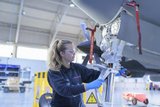Defining the Future Podcast Bonus Episode - the Multi-INT Approach
How is the multi-intelligent approach bringing new capabilities to the modern battlefield?
The UK space sector has grown rapidly in recent years, with business and government eyeing ambitious goals for the future.
However, there are a number of challenges that need to be overcome, according to senior industry figures, from Brexit to a recruitment shortfall.
With a current total income of about £15 billion, the British space industry already employs around 40,000 people. A range of programmes on the horizon offer fertile ground for future development, both domestically and internationally.
One of the most significant opportunities, for instance, is NASA’s Artemis programme, which aims to land the first woman and the next man on the moon by the middle of the current decade.
But as the sector looks to the future, it must also consider the lessons of the past, says Paul Day, Business Development Executive, Space, at Raytheon UK.
Day places the national sector in the context of recent decades, stretching right back to the first moon landing of 1969. From the 1950s to the 1970s, Day argues, ‘the UK was really at the cutting edge of space, space launch and every aspect. But then for all sorts of reasons we rowed back from that – now we’re getting back there again’.
While the industry has renewed ambition, it also has the structures to back it up, including government backing, partnerships between primes such as Raytheon and small and medium-sized enterprises (SMEs), and international collaborations with key partners like the US and other European states. ‘That's the message - it's all about everybody getting involved, bringing the skills that this country has always had, bringing the resources and entrepreneurship to the fore and investing in it,’ Day says
A strong partnership between government and industry has been key to the growth of the UK space sector.
Much of this work is led by the UK Space Agency. Although it is just over ten years old, the agency has rapidly expanded its capabilities, working closely with the European Space Agency (ESA) and in partnership with the private sector and academia.
The agency is now working to expand its international partnerships, as shown through the Australia UK Space Bridge, aimed at boosting collaboration between the sectors in the two countries. It also supports the industry with funding, for example through the new National Space Innovation Programme (NSIP), which provides finances for projects in the domain, including through a recently announced international element.
‘We the agency don't deliver the growth - it's the industry and academia,’ says Arfan Chaudhry, the UK Space Agency’s head of international policy. ‘Our job is to make sure that we provide the conditions and the environment.’
This is achieved through engaging with industry, academia and trade associations, Chaudhry explains. He points in particular to the importance of NSIP, in both its domestic and international elements.
NSIP provides support to industry and encourages UK trade through a focus on three key areas: science, security and the trade agenda. It is also designed to ensure that the country can work more collaboratively internationally, with a dedicated fund for national engagement with key partner nations, notably the other Five Eyes countries: Australia, New Zealand, the US and Canada.
NSIP also aims to help build new links with key European allies, particularly France, Germany, Italy and Spain, as well as support relations with newer partners like Japan.
While the UK’s decision to leave the EU has caused uncertainty in many areas, the UK Space Agency is confident the industry will remain resilient in the post-Brexit world, Chaudhry says.
The UK was a founding member of ESA, and plans to invest about £375 million in the agency annually over the next five years, which he says would give the country access to a range of important programmes.
It plans to continue working through ESA, as well as collaborating with other international partners and pursuing its own domestic ambitions, he says.
However, as with many industries built on science, technology, engineering and mathematics (STEM) subjects, the space sector struggles to recruit enough people to fill its growing demands.
The UK Space Agency has been looking at ways of filling the pipeline, encouraging students to study relevant subjects right from primary level through to degrees and apprenticeships, says Kathie Bowden, the agency’s lead for skills and careers development.
‘We know that there are longstanding issues with recruitment – we don't get enough people. So one of the things that we've been doing, crucially, has been looking at how we can fuel the pipeline… right from primary through secondary school, encouraging young people to continue studying the right subjects, particularly STEM ones, then going on to do degrees and apprenticeships that will help them to get the careers that we would like to see them get.’
For defence primes such as Raytheon, the establishment of a Space Directorate in the UK Ministry of Defence is particularly significant.
The crossover between the commercial and defence domains brings huge opportunities, Day says, ‘being able to take in from the commercial side of the house the rapidity with which they can innovate and move, [and combining this] with the more challenging risk aspects and assurance aspects you have from the defence side of the world’.
A governance and regulation strategy is coming into place that will further fuel such cross-fertilisation, which will help boost the attractiveness of the UK as a place to do business, particularly for bigger companies.
SMEs play a crucial role in the space ecosystem. This is a central part of NSIP, which focuses on projects with values ranging from £200,000 to £2.5 million; it could develop into a four-year programme through the 2020 Comprehensive Spending Review, according to Chaudhry.
‘There's indigenous growth, UK growth, but there's also… significant export potential for the great product, capability and skillsets that we have in the UK,’ he says.
This potential will be met through ‘engagement and dialogue with industry, listening to their requirements… part of that has been the development of the National Space Innovation Programme’, he noted.
While there are challenges ahead for SMEs, they are outweighed by the opportunities, according to Mark Dumville, CEO of GMV NSL, a developer of satellite navigation technologies.
In particular, Dumville points to the downstream market – the production of services connected to space, such as satellite communications, rather than the hardware for the platforms. Government is playing a critical role in driving demand in this market, he says.
‘If government in the UK can actually be that first customer, then there's a product that can go commercially; it can also [be exported] to other governments, to other industry partners,’ he says.
Raytheon’s size, scale and geographic footprint gives it a unique perspective on the environment for SMEs, and puts it in a position to help promote the interests of those smaller companies, Day explains.
This could be through collaboration, or in helping build relationships between industry and governments around the world. The company can also provide access to its own facilities and capabilities.
‘Whilst we're doing that to support Raytheon's global trade, there's a capability there that we can open up to smaller companies to help them… get over some of those barriers, such as scalability,’ Day explains.
‘That again is really part of having a vision for global Britain and helping that “levelling up” across the UK.’
To learn more about the factors shaping the UK space sector, listen to Episode 2 of the Defining the Future podcast.

How is the multi-intelligent approach bringing new capabilities to the modern battlefield?

The combination of sensors is key to forming a comprehensive picture of the modern battlefield.

What's the role of the UK space sector in the global Britain envisioned for the future?

The world of work is changing, with COVID-19 and emerging technologies accelerating existing trends in defence and wider afield. Raytheon UK believes the training sector …

Future-proofing our training is the best way of ensuring our Armed Forces are equipped to keep us safe and secure in the future says Frazer …

Welcome to Shephard Studio’s Defining the Future podcast, sponsored by our partner Raytheon UK. Listen on Apple Podcasts, Google Podcasts, Spotify and more. The way we work is changing …